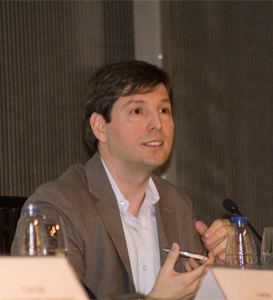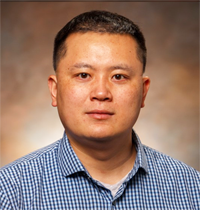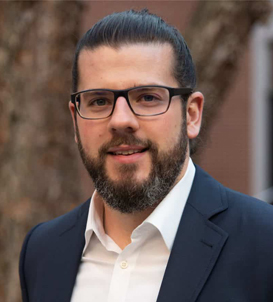Sergio Martin
Past, present and future in remote experimentation
Studying emerging technology trends and its impact on education during the years allow researchers, practitioners and decision-makers to be prepared to face the new challenges within the educational sector.
This talk will analyse how experts perceived remote experimentation in the past, some trends of use of virtual and remote labs in the present and the new trends for remote experimentation in the future.
 |
Sergio Martin (M’06-SM’15) was born in Madrid, Spain in 1980. He is Computer Engineer by the Carlos III University of Madrid in 2002. He received the PhD by the Industrial Engineering School of National University for Distance Education, Madrid, Spain, in 2010. He is Associate Professor at UNED, where he teaches subjects related to microcontrollers and digital electronics since 2007 in the Industrial Engineering School of UNED. |
Dr. Martin has participated since 2002 in national and international research projects related to Internet of Things, mobile devices, as well as in projects related to “e-learning”, virtual and remote labs, and new technologies applied to distance education. He has published more than 200 papers both in international journals and conferences. Currently he coordinates the I4Labs research group focused on Connected Industry and Educational Technologies for Engineering.
He has coordinated several international projects about technology trends analysis, such as Horizon Reports on STEM+ (2012-2013), the Engineering Education Report (2012-2015) and Engineering Education Technologies Report (2019-). He has also developed or supervised the development of more than 200 virtual and remote labs. He has been awarded with the 2019 GOLC Award to Best Simulated Laboratory.
Xuewei Zhang
Power Up Jordan: Piloting a Virtual Training Program and Idea-A-Thon on Emerging Technologies for Jordanian Youth
The long-term, overarching goal of the project “Power Up Jordan” is to upgrade the employment prospects of Jordanian youth by increasing their exposure to the trends of global technology development. Toward this goal, the initial phase of the project includes the design and piloting of a virtual platform to engage Jordanian college students and other college-age young people in learning emerging technologies in energy, telecommunication, computing, and other industries, with a special focus on their relevance and implications to the Jordanian communities. Those who complete the training program are eligible to team up and participate in an online competition (Idea-A-Thon), in which each team is asked to identify a problem in their community and use what they learned from the training program to propose innovative solutions. In this talk, the design, implementation, and preliminary assessment of the virtual training program and an Idea-A-Thon) is presented. At the design stage, we will introduce our effort to highlight the connections between the emerging technologies and the Jordanian society. At the implementation stage, we will share the experience in solving practical problems such as language barriers, international collaboration, participant persistence, etc. At the assessment stage, we will make some reflections on the project activities and present our perspectives on the transferability and sustainability of the initiative.
 |
Xuewei Zhang received his B.S. and M.S. degrees from Tsinghua University (Beijing, China) in 2007 and 2009 and Ph.D. degree from Massachusetts Institute of Technology (Cambridge, MA, USA) in 2014, all in Electrical Engineering. His research background is within the fields of high voltage engineering and plasma physics. Starting 2021, he is an associate professor (tenured) in the Department of Electrical Engineering and Computer Science at Texas A&M University, Kingsville (Kingsville, TX, USA). Since joining the current employer in 2015, he has been the core faculty member of the newly launched Ph.D. Program in Sustainable Energy Systems Engineering and has so far supervised 4 Ph.D. dissertations. In recent years, he has also been the director of several engineering education projects involving curriculum improvement, work-based training, and virtual learning programs. |
Dominik May
Connecting Cross-Reality Learning Spaces and Online Laboratories through Engineering Education Research
Digitalization is changing almost all areas of our lives, including university teaching and learning. This is nothing new at all. What is exciting, however, is the form and diversity of this change. Each scientific area faces its own challenges, but there are also very individual opportunities for innovation through and with digitalization in every field.
In this talk, Dr. May will look at engineering, Cross-Reality technologies, and the respective educational research perspectives. Cross Reality technologies–understood here as an umbrella term for all digitally created or supported realities in the sense of Augmented Reality (AR), Virtual Reality (VR), and Mixed or Merged Reality (MR)–offer special innovation potential for engineering science teaching. This is especially true in the context of teaching and learning in the laboratory, which has been an essential part of every engineering science program for decades.
Dr. May will look at the innovative potential of augmented labs, remote labs, and fully virtual labs in engineering education. Especially in the current times, in which physical presence and social contacts in educational labs are heavily limited, those types of labs offer great opportunities; sometimes they are actually the only way to gain experiential experiences. However, examples from practice show that face-to-face teaching can benefit from such developments and innovations, too. It should not be a clash of different realities, but rather a mutually supportive and joint process in the interest of better teaching and learning practice as a whole.
In this way, Cross Reality will change university teaching for the better, not only in the engineering sciences. This process needs to be both motivated and guided by Engineering Education Research.
 |
Dr. May is an Assistant Professor in the Engineering Education Transformations Institute, University of Georgia, Athens, USA, with an emphasis on cross-reality, online, and intercultural engineering education research. He focuses on developing broader educational strategies for the design and use of online laboratories and equipment in engineering education, putting these into practice and provide the evidence base for further development efforts. Moreover, he is developing instructional concepts to bring students into international study contexts so that they can experience intercultural collaboration and develop respective competences. |
